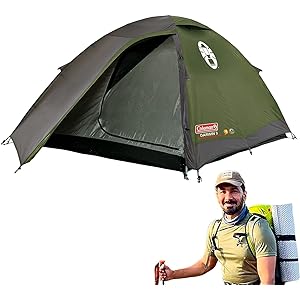Camping is more than just a recreational activity it is a chance to reconnect with nature, unplug from the digital world, and experience the great outdoors. One of the key elements that contribute to a successful camping trip is the tent, your home away from home in the wilderness. Let’s delve into the secrets behind the ideal camping tent that ensures sheltered bliss during your outdoor adventures.
Size Matters:
 Selecting the right tent size is crucial for a comfortable camping experience. Too small, and you will feel cramped too large, and you may struggle with setup and carrying. Consider the number of people, gear, and the type of camping you will be doing. A spacious tent with a little extra room is often a wise choice.
Selecting the right tent size is crucial for a comfortable camping experience. Too small, and you will feel cramped too large, and you may struggle with setup and carrying. Consider the number of people, gear, and the type of camping you will be doing. A spacious tent with a little extra room is often a wise choice.
Weight and Portability:
Modern camping tents come in various materials, each influencing the tent’s weight and portability. If you are planning a backpacking adventure, opt for lightweight materials like nylon or polyester. Car campers may prioritize durability over weight, choosing a slightly heavier tent with more features.
Weather Resistance:
The unpredictable nature of outdoor environments necessitates a tent that can withstand different weather conditions. Look for a tent with a high hydrostatic head rating to ensure water resistance while plan a camping trip. Additionally, a rainfly and a bathtub-style floor can provide an extra layer of protection against rain and ground moisture.
Ventilation:
Proper ventilation is key to preventing condensation inside the tent. Look for tents with mesh panels and adjustable vents to allow air circulation. This not only helps control moisture but also keeps the interior cool during warmer seasons.
Setup Ease:
Nobody wants to spend precious camping time struggling with a complicated tent setup. Opt for a tent with a straightforward design and color-coded poles for easy assembly. Freestanding tents are particularly convenient as they can be moved and repositioned after setup.
Durability:
Investing in a durable tent is essential for withstanding the wear and tear of outdoor adventures. Check the denier rating of the tent fabric – a higher denier indicates greater durability. Reinforced seams, sturdy zippers, and a robust frame also contribute to a tent’s longevity.
Seasonal Suitability:
Not all tents are created equal when it comes to the seasons they can handle. Three-season tents are versatile and suitable for spring, summer, and fall, while four-season tents are designed to withstand harsh winter conditions. Choose a tent based on the seasons and climates you anticipate encountering during your camping excursions.
Vestibules and Storage:
Having a designated space for storing gear outside the sleeping area keeps the tent organized and clutter-free. Look for tents with vestibules – extensions of the tent that provide additional storage space for backpacks, boots, and other equipment.
Budget Considerations:
While it is tempting to go for the latest and greatest tent with all the bells and whistles, it is essential to consider your budget. Determine your priorities and strike a balance between features and cost to find a tent that meets your needs without breaking the bank. By unraveling the secrets behind these key elements, you can embark on your camping adventures with the confidence that your sheltered bliss awaits amidst the great outdoors.